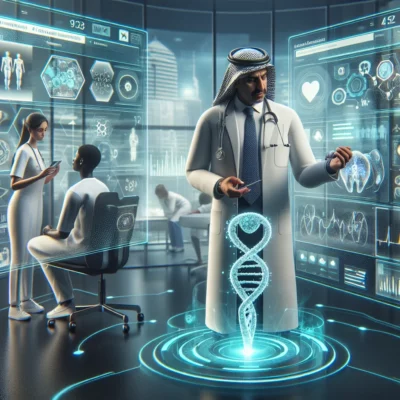The Evolution of Healthcare Technology
Healthcare has come a long way from the days of rudimentary medical practices. The 20th century witnessed significant advancements such as antibiotics, vaccines, and imaging technologies like X-rays and MRIs. These innovations laid the foundation for the next generation of healthcare solutions that we are seeing today.
Key Technologies Driving Change
- Artificial Intelligence (AI): AI algorithms can analyze vast amounts of data faster and more accurately than humans, aiding in diagnostics and personalized treatment plans.
- Internet of Things (IoT): Connected devices enable continuous health monitoring, providing real-time data to healthcare providers.
- Telemedicine: Virtual consultations and remote care have become more accessible, especially during the COVID-19 pandemic.
- Wearable Devices: Gadgets like smartwatches and fitness trackers help individuals monitor their health metrics daily.
The Role of Big Data and Analytics
Big data analytics is transforming healthcare by offering insights that were previously unattainable. By analyzing patient data, healthcare providers can predict disease outbreaks, personalize treatments, and improve patient outcomes. This data-driven approach is paving the way for more effective and efficient healthcare systems.
Preventative Care: A New Frontier
Preventative care aims to stop diseases before they start, and next-gen technologies are making this more achievable than ever.
AI and Machine Learning in Disease Prediction
AI and machine learning models can predict the likelihood of diseases such as diabetes, heart disease, and cancer by analyzing genetic, lifestyle, and environmental data. These predictions enable early interventions, significantly improving patient outcomes.
Wearable Technology for Daily Health Monitoring
Wearable devices like Fitbit, Apple Watch, and Garmin trackers monitor vital signs such as heart rate, sleep patterns, and physical activity. This continuous monitoring helps individuals make informed decisions about their health and can alert them to potential issues before they become serious.
Personalized Health Plans Through Genetic Testing
Genetic testing companies like 23andMe and AncestryDNA provide insights into an individual’s genetic predispositions. Coupled with data analysis, these insights can be used to create personalized health plans that cater to an individual’s specific needs, promoting a proactive approach to health management.
Chronic Disease Management: A Paradigm Shift
Chronic diseases such as diabetes, hypertension, and asthma require ongoing management. Next-gen solutions are making it easier for patients to manage these conditions effectively.
Real-Time Monitoring and Remote Patient Management
IoT devices like glucose monitors and blood pressure cuffs can send real-time data to healthcare providers, allowing for timely interventions. This continuous monitoring reduces the need for frequent doctor visits and helps in managing the disease more effectively.
Telemedicine: Bridging the Gap
Telemedicine platforms enable patients to consult with healthcare providers from the comfort of their homes. This is particularly beneficial for those with mobility issues or those living in remote areas. Telemedicine also allows for regular follow-ups and adjustments to treatment plans without the need for in-person visits.
Case Studies
- Diabetes Management: Patients using continuous glucose monitors (CGMs) and insulin pumps have reported better blood sugar control and fewer complications.
- Hypertension: Remote monitoring of blood pressure has led to more accurate medication adjustments and better overall management of the condition.
The Role of Big Data and Analytics
Big data is not just a buzzword; it’s a transformative force in healthcare.
Revolutionizing Patient Care
By aggregating and analyzing data from various sources, healthcare providers can gain a comprehensive view of patient health. This holistic approach leads to more accurate diagnoses and personalized treatment plans.
Predictive Analytics
Predictive analytics can identify at-risk populations by analyzing patterns and trends in health data. This proactive approach allows for early interventions, reducing the incidence of chronic diseases and improving public health outcomes.
Data Security and Privacy Concerns
With the increasing use of digital health solutions, data security and privacy have become paramount. Ensuring that patient data is secure and used ethically is crucial for maintaining trust and compliance with regulations like GDPR and HIPAA.
Challenges and Opportunities
While the benefits of next-gen healthcare solutions are clear, there are challenges to their widespread adoption.
Potential Barriers
- Cost: High initial costs for advanced technologies can be a barrier for both healthcare providers and patients.
- Interoperability: Different systems and devices often lack compatibility, making data sharing difficult.
- Training: Healthcare professionals need training to effectively use new technologies.
Importance of Regulatory Frameworks
Regulatory frameworks and standards are essential for ensuring the safety and efficacy of new healthcare technologies. They also provide guidelines for data security and patient privacy, which are critical for gaining public trust.
Future Opportunities
Despite the challenges, the future of healthcare is bright. Innovations in AI, IoT, and big data analytics hold immense potential for improving preventative care and chronic disease management. By addressing the existing barriers, we can unlock these opportunities and revolutionize healthcare.
Looking Ahead: The Future of Healthcare
The horizon is filled with emerging technologies that promise to take healthcare to new heights.
Emerging Technologies
- Blockchain: For secure and transparent medical records.
- 3D Printing: For custom prosthetics and even organ printing.
- Nanotechnology: For targeted drug delivery and advanced diagnostics.
Global Health Improvements
Next-gen healthcare solutions have the potential to improve health outcomes globally. By making advanced care accessible and affordable, we can address health disparities and improve the quality of life for people around the world.
Encouraging a Proactive Approach
Technology is empowering individuals to take control of their health. From wearable devices to personalized health plans, the tools are available for a proactive approach to wellness. By embracing these technologies, we can move from a reactive to a preventative healthcare model, ultimately leading to healthier lives.
Revolutionizing health through next-gen solutions is not just a possibility; it’s a reality that is unfolding before our eyes. By leveraging these advancements, we can create a healthier future for all.
